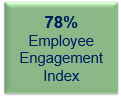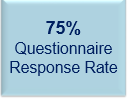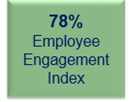Aberdeen City HSCP
![]() iMatter: Employee Engagement in the Aberdeen City Health & Social Care Partnership
iMatter: Employee Engagement in the Aberdeen City Health & Social Care Partnership
What did the 2018 iMatter results show?
40% action plans completed by deadline
 |
65% of employees completed the iMatter questionnaire. The average response rate across Grampian was 61%. |
| 64% of teams achieved the target response rate to receive a team report. The average response rate across Grampian was 63%. |  |
 |
Represents how engaged all employees who completed the questionnaire felt. The average index score across Grampian was 77%. |
| Employees rated working within the Aberdeen City Health & Social Care Partnership as 6.96 out of 10. |  |
What did the 2017 iMatter results show?
65% Action plans completed by deadline
 |
Despite employees being more aware of iMatter this year and the questionnaire issued out-with the school holidays, the response rate dropped by 10% in 2018. |
| The number of teams who did not receive a team report due to not achieving the required questionnaire response rate increased. This includes teams who did and did not receive a report in 2017. |  |
 |
Despite the lower response rate, the EEI score has remained the same |
| Employees rated working within the Aberdeen City Health & Social Care Partnership slightly higher in 2017 than 2018 |  |
What does this mean for the Aberdeen City Health and Social Care Partnership (ACHSCP)?
The results of the ACHSCP’s 2018 iMatter report are positive. All scores were over 67% meaning these areas are to be strived and celebrated, with the exception of the following:
- I feel senior managers responsible for the organisation are sufficiently visible (64%) (2017 score: 64%)
- I feel involved in decisions relating to my organisation (60%) (2017 score: 60%)
- I feel performance is managed well within my organisation (66%) (2017 score: 66%)
These scores mean these are areas which need to be monitored to further improve.
These were also the 3 lowest scores in iMatter 2017 with the same percentages.
Next Steps: The chief officer and executive team have cussed on these areas for the Partnership’s 2018 iMatter action plan. Their proposed actions will involve improved leadership by all managers and greater engagement and communication with all employees across the Partnership.
What changes did we make in 2018?
- Improved the data collection method for staff and team data to make it easier and quicker for managers.
- Encouraged managers to avoid teams of less than four staff where possible and appropriate, This was based on employee’s concerns over confidentiality, in order to increase questionnaire anonymity and increase the questionnaire response rate. For example teams of 1 or 2 staff who share a line manager and have the same role.
- Gave managers more flexibility over team names and team members. For example changing team names to what they are known as locally and creating multi-disciplinary teams.
- Changed the timing of the questionnaire to avoid school holidays.
- Rolled out online iMatter awareness sessions for staff and online training for managers.
Did these Changes work?
✔ Managers were more receptive to the new method of data collection and updating their own teams on Webropol, with assistance from the iMatter administrator where required.
✖ There were 38 teams of four or less in 2017 and 29 in 2018, however more teams of 5 or more did not improve the response rate. In contrast 27 of the 29 small teams did receive a team report.
✖ There were more multi-disciplinary teams but this did not improve the response rate or increase the number of action plans completed.
✖ Some term time teams (teams who are on leave during school holidays) had a lower response rate this year despite moving the timing of the questionnaire.
What have we learned?
- Not all managers have team meetings with their staff so found it difficult to arrange an action planning meeting with them.
- Some managers overestimated how much time the action planning process takes, particularly completing action plans on the Webropol system.
- Of the 68 teams who received a team report is 2017 and did not receive a team report in 2018, 41 (60%) did not have an action plan in 2017. Staff have verbally stated they were unlikely to complete the questionnaire in 2018 as they completed it in 2017 and no action was taken.
What can we do to improve in 2019?
- Increase the promotion of iMatter to the same level as 2017.
- Hold ACHSCP led iMatter awareness sessions for staff in various locations.
- Hold ACHSCP led iMatter training sessions for managers in various locations. These will focus more on using the Webropol system, team structures and action planning.
- Communicate positive iMatter case studies to show how iMatter can improve employee engagement and team working.
- Communicate what the ACHSCP executive team is doing as a result of the 2018 directorate report, for example a ‘You Said, We Did’.
